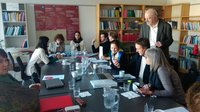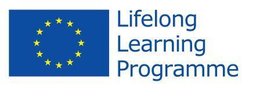The Big Picture: why is IntlUni important?
The work of the IntlUni project is drawing to a close as we approach our final meeting in Brussels on 24 September. This final conference will see the culmination of project work in the launch of the IntlUni Recommendations document and it will celebrate a rich network of shared experience in the IntlUni partnership. At our most recent partner meeting, we asked our partners why the project has been important. Here are some of their comments:
2015.06.10 |
The Big Picture
The project has involved 38 partners from 27 countries.
“IntlUni captures the big picture…so we are really a microcosm of Europe. And because of that microcosm, we have been able to paint a big picture of where we are with internationalisation of higher education, in the sense of what goes on in the classroom, where the students and the teachers have different cultural and linguistic backgrounds.” – Karen M. Lauridsen, Project Coordinator, Aarhus University.
Focussing on the classroom
The project has looked at classroom practice and classroom experience. It has sought to share experience and draw knowledge together across the network of teachers.
“Where this project has been useful, is its focussing in the classroom, if you like, or the multicultural, multilingual learning space. Because often institutions tend to think more about how to attract students, and in more general terms about ‘let’s do it in English’ and they don’t really think about ‘ok, but what does it mean ‘on the ground’ so to speak” – Sharon Millar, University of Southern Denmark
Setting the frame for Diversity
Project partners represent an extremely diverse picture in terms of institutional approaches and attitudes towards internationalisation, the nature of challenges and good practice in the multilingual, multicultural learning space, and of how languages are supported or integrated into this space. Project work broadened knowledge about policy and practices across Europe for all participants and helped to establish a background for reflection on local practices and beliefs. IntlUni acknowledges and celebrates that diversity in its key documents: the IntlUni Principles and the IntlUni Recommendations (forthcoming). Both documents can be integrated and applied to diverse contexts.
“The IntlUni principles are not prescriptions and the recommendations won’t be either: they set the frame for diversity.” – Thomas Vogel, Europa-Universität Viadrina Frankfurt (Oder)
Initiating discussion
Involvement in the project has, for many partners, initiated discussion within institutions about the nature of internationalisation in each local or regional context, thereby contributing to on-going debate and activity in this area.
“I think that [involvement in the project] brings external validity to your discussions. It gives foundations to what you are saying to people [about internationalisation].”- Kevin Haines, University of Groningen.
Qualitative approach
The project has taken a qualitative approach towards the collection of information and the sharing of local experiences across the partnership. This has allowed a rich and dynamic picture to emerge of local challenges and good practice in the multilingual learning space. The Recommendations for Quality which arise from this information will allow other education professionals and teachers to reflect on their own educational context and relate the recommendations to their own local situation.
“We’ve taken a qualitative approach within which you can negotiate your local situation.” – Karen M. Lauridsen, Project Coordinator, Aarhus University.





